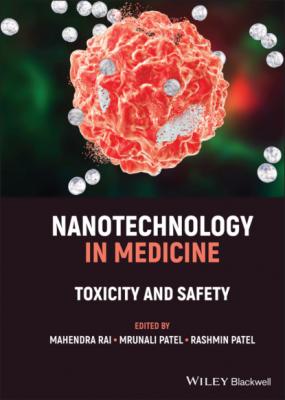Nanotechnology in Medicine. Группа авторов
Чтение книги онлайн.
Читать онлайн книгу Nanotechnology in Medicine - Группа авторов страница 28
 C.E. (1984). Microbial metabolism of polycyclic aromatic hydrocarbons. Advances in Applied Microbiology 30: 31–37.
C.E. (1984). Microbial metabolism of polycyclic aromatic hydrocarbons. Advances in Applied Microbiology 30: 31–37.13 Cerniglia, C.E. (1997). Fungal metabolism of polycyclic aromatic hydrocarbons: past, present and future applications in bioremediation. Journal of Industrial Microbiology and Biotechnology 19: 324–333.
14 Cerniglia, C.E., White, G.L., and Hettich, R.H. (1985). Fungal metabolism and detoxification of polycyclic aromatic hydrocarbons. Archives of Microbiology 143: 105–110.
15 Chaabane, L., Chahdoura, H., Mehdaoui, R. et al. (2020). Functionalization of developed bacterial cellulose with magnetite nanoparticles for nanobiotechnology and nanomedicine applications. Carbohydrate Polymers 116707 https://doi.org/10.1016/j.carbpol.2020.116707.
16 Chaney, A.M. and Carlson, G.P. (1995). Comparison of rat hepatic and pulmonary microsomal metabolism of benzene and the lack of benzene induced pneumotoxicity and hepatotoxicity. Toxicology 104: 53–62.
17 Cheng, Y., Yu, S., Wang, J. et al. (2012). In vitro and in vivo antitumor activity of doxorubicin‐loaded alginic‐acid‐based nanoparticles. Macromolecular Bioscience 12 (10): 1326–1335. https://doi.org/10.1002/mabi.201200165.
18 Coates, J.D., Anderson, R.T., Woodward, J.C. et al. (1996). Anaerobic hydrocarbon degradation in petroleum contaminated harbor sediments under sulfate‐reducing and artificially imposed iron‐reducing conditions. Environmental Science and Technology 30: 2784–2789.
19 Dhas, N.L., Ige, P.P., and Kudarha, R.R. (2015). Design, optimization and in‐vitro study of folic acid conjugated‐chitosan functionalized PLGA nanoparticle for delivery of bicalutamide in prostate cancer. Powder Technology 283: 234–245.
20 Dougherty, D., Garte, S., Barchowsky, A. et al. (2008). NQO1, MPO, CYP2E1, GSTT1 and GSTM1 polymorphisms and biological effects of benzene exposure—a literature review. Toxicology Letters 182: 7–17.
21 Drulis‐Kawa, Z. and Dorotkiewicz‐Jach, A. (2010). Liposomes as delivery systems for antibiotics. International Journal of Pharmaceutics 387: 187–198.
22 Efthimiadou, E.K., Metaxa, A.F., and Kordas, G. (2014). Modified polysaccharides as drug delivery. Polysaccharides: 1–26. https://doi.org/10.1007/978‐3‐319‐03751‐6_23‐1.
23 Eggers, J. and Steinbuchel, A. (2013). Poly(3‐Hydroxybutyrate) degradation in Ralstonia eutropha H16 is mediated stereoselectively to (S)‐3‐hydroxybutyryl coenzyme a (CoA) via crotonyl‐CoA. Journal of Bacteriology 195: 3213–3223. https://doi.org/10.1128/jb.00358‐13.
24 Eroglu, M., Toksoy, O.E., Cansever, M.E., and Sennaroglu, B.M. (2017). Sugar based biopolymers in nanomedicine; new emerging era for cancer imaging and therapy. Current Topics in Medicinal Chemistry 17: 1507–1520.
25 FAO (n.d.). Seaweeds used as a source of alginate. http://www.fao.org/3/y4765e/y4765e07.htm (accessed 18 December 2020).
26 Franchetti, S.M.M. and Marconato, J.C. (2006). Polímeros biodegradáveis – uma solução parcial para diminuir a quantidade dos resíduos plásticos. Química Nova 29: 811–816.
27 Gao, M., Coggin, A., Yagnik, K., and Teplitski, M. (2012). Role of specific quorum‐sensing signals in the regulation of exopolysaccharide II production within Sinorhizobium meliloti spreading colonies. PLoS One 7: e42611. https://doi.org/10.1371/jornal.pone.0042611.
28 Garcia, F.G., Leyva, M.E., Queiroz, A.A.A., and Higa, O. (2009). Novas tendências dos polímeros epoxídicos: propriedades biológicas in vitro de formulações para aplicações médicas. Polímeros 19: 177–182. https://doi.org/10.1590/S0104‐14282009000300004.
29 Gebhardt, M. and Geier, J. (1996). Evaluation of patch test results with denture material series. Contact Dermatitis 34: 191–195.
30 Gorgieva, S. (2020). Bacterial cellulose as a versatile platform for research and development of biomedical materials. Processes 8: 624.
31 Gorkovenko, A., Zhang, J., Gross, R., A. et al. (1997). Bioengineering of emulsifier structure: emulsan analogs. Canadian Journal of Microbiology 43: 384–390.
32 Gupta, P., Pruthi, P.A., and Pruthi, V. (2019). Role of exopolysaccharides in biofilm formation. Introduction to Biofilm Engineering: 17–57. https://doi.org/10.1021/bk‐2019‐1323.ch002.
33 Hammel, K.E. (1995). Mechanism for polycyclic aromatic hydrocarbon degradation by ligninolytic fungi. Environmental Health Perspectives 103: 41–43.
34 Hartwig, A. (2010). The role of DNA repair in benzene‐induced carcinogenesis. Chemico‐Biological Interactions 184: 269–272.
35 Helton, J. and Storrs, F. (1994). The burning mouth syndrome: lack of a role for contact urticaria and contact dermatitis. Journal of the American Academy of Dermatology 31: 201–205.
36 Huang, G., Chen, X., and Huang, H. (2016). Chemical modifications and biological activities of polysaccharides. Current Drug Targets 17: 1799–1803. 27138762. https://doi.org/10.2174/1389450117666160502151004.
37 Iguchi, M., Yamanaka, S., and Budhiono, A. (2000). Bacterial cellulose – a masterpiece of nature's arts. Journal of Materials Science 35: 261–270.
38 Jacob, J., Haponiuk, J.T., Thomas, S., and Gopi, S. (2018). Biopolymer based nanomaterials in drug delivery systems: a review. Materials Today Chemistry 9: 43–55. https://doi.org/10.1016/j.mtchem.2018.05.002.
39 Jacques, R.J.S., Bento, F.M., Antoniolli, Z.I., and Camargo, F.A.O. (2007). Biorremediação de solos contaminados com hidrocarbonetos aromáticos policíclicos. Ciência Rural 37: 1192–1201.
40 Jansson, P., Kenne, L., and Lindberg, B. (1975). Structure of the extracellular polysaccharide from Xanthomonas campestris. Carbohydrate Research 45: 275–282. https://doi.org/10.1016/S0008‐6215(00)85885‐1.
41 Kanzaki, T., Kabasawa, Y., Jinno, T., and Isayama, K. (1989). Contact stomatitis due to methyl methacrylate monomer. Contact Dermatitis 20: 146–148. https://doi.org/10.1111/j.1600‐0536.1989.tb03125.x.
42 Karakuş, S. (2019). A novel ZnO nanoparticle as drug nanocarrier in therapeutic applications: kinetic models and error analysis. Journal of the Turkish Chemical Society Section A: Chemistry 6: 119–132.
43 Kaur, K., Dattajirao, V., Shrivastava, V., and Bhardwaj, U. (2012). Isolation and characterization of chitosan‐producing bacteria from beaches of Chennai, India. Enzyme Research 421683: 6.
44 Kim, S., Vermeulen, R., Waidyanatha, S. et al. (2006). Modeling human metabolism of benzene following occupational and environmental exposures. Cancer Epidemiology, Biomarkers and Prevention 15: 2246–2252.